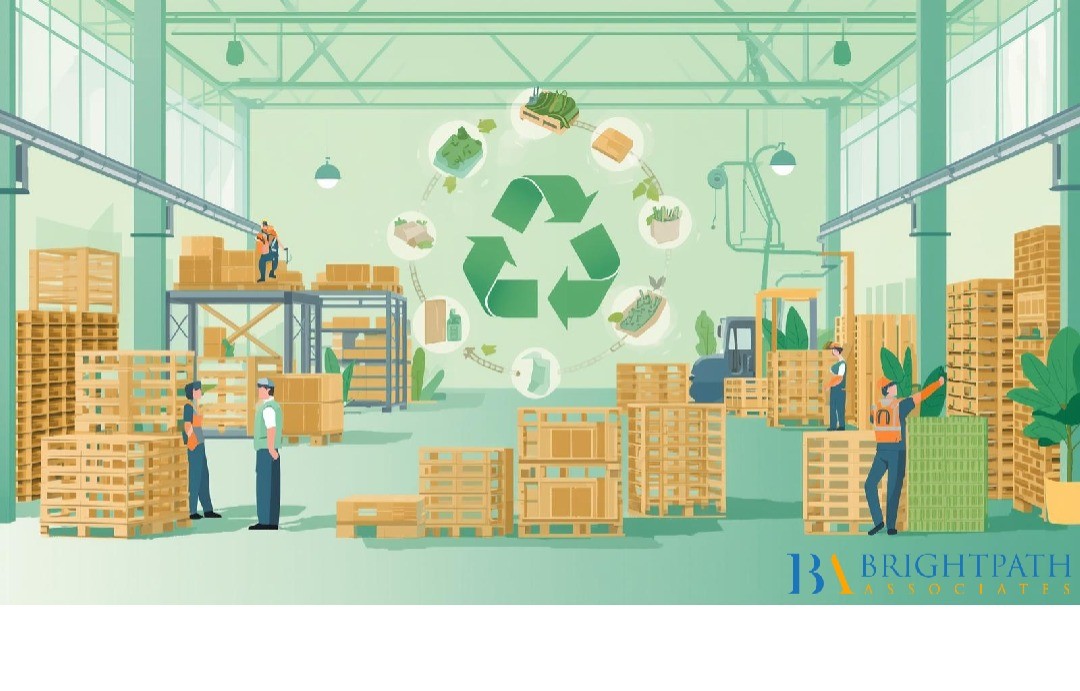Introduction
Sustainability has become a cornerstone of innovation, especially within the #LogisticsIndustry, where growing environmental concerns demand a comprehensive rethinking of standard practices. The drive towards greener practices is not only a moral imperative but also a significant opportunity for enhanced efficiency and cost savings. Among the myriad components of logistics operations, the wood pallet stands out as a pivotal element needing greater attention and strategic management. With billions of wood pallets in circulation globally, ensuring their sustainable management is vital, not just from an economic perspective, but also to mitigate the considerable environmental impact associated with their production and disposal.
The State of Wood Pallet Recycling
In recent years, the focus on recycling wood pallets has intensified, reflecting a broader movement towards sustainability in manufacturing and logistics. Industry leaders are advocating for systems that not only recycle but also extend the useful life of these essential tools through reparability and reuse. Trends suggest a significant shift towards fully recyclable models as well as improved methods for recovering materials efficiently and effectively. The adoption of advanced technologies, such as enhanced tracking systems for pallet inventory and condition, is paving the way for more effective recycling processes. These innovations align with broader industry movements towards logistics innovation and freight shipping optimization. Furthermore, there is a growing emphasis on closed-loop systems, where wood pallets are returned to the supply chain for reuse, creating a circular economy that minimizes waste and conserves resources.
Challenges in Wood Pallet Management
Despite the progress being made, several challenges remain crucial to the successful management of #WoodPallets. A significant barrier is the lack of standardized recycling practices across various regions globally, which complicates the recycling process and can lead to inconsistencies in how materials are handled. Additionally, many companies still struggle with inefficient pallet disposal methods, which contribute to unnecessary environmental damage and landfill overcrowding. Ineffective recycling practices result in millions of tons of wood waste each year, perpetuating a cycle of continuous resource depletion that is contrary to the sustainable objectives many organizations aim to achieve. Additionally, there are economic constraints that many businesses face, making the transition to sustainable methods a challenging endeavor in the short term, though it promises long-term benefits.
Solutions and Innovations in the Industry
Forward-thinking companies are exploring various innovative avenues in logistics and shipping optimization as effective pathways to sustainability. The introduction of digital tracking technologies is revolutionizing transportation dispatch services, ensuring that pallets are managed efficiently and transparently from start to finish. Delivery technology innovations, such as the integration of IoT devices into pallets, are now enabling firms to monitor their status, location, and environmental conditions in real-time. By gathering data on usage patterns, maintenance needs, and end-of-life options, companies can optimize their pallet fleets and reduce waste significantly. These approaches reflect the delivery industry’s move towards a digitally interconnected ecosystem, which supports the seamless integration of sustainable practices into conventional operations. Furthermore, partnerships between logistics providers and recycling firms are emerging, allowing for streamlined processes in pallet returns and reclamation.
The Role of Executive Search Recruitment
A critical aspect of fostering these advancements within the logistics and #SupplyChainSector is gathering the right talent to drive critical changes forward. The delivery sector is currently facing a notable shortage of tech talent, which is essential for pushing forward these kinds of innovations in sustainable practices. #ExecutiveSearchRecruitment agencies, like BrightPath Associates, play a crucial role in bridging this talent gap. By focusing on industry-specific recruitment strategies, these agencies help logistics companies find leaders who are not only skilled in logistics operation but also possess a visionary outlook toward sustainability and innovation. Case studies are emerging that demonstrate how certain freight brokerage services have successfully integrated sustainable strategies through strong leadership, highlighting the undeniable importance of having leaders who prioritize eco-friendly solutions in their operational frameworks.
Future Outlook and Trends
The future of parcel delivery and e-commerce logistics is poised for remarkable advancements, with new insights and technologies constantly reshaping the landscape. Companies are increasingly looking to integrate recycled materials into freight shipping, reflecting a broader trend of adopting eco-friendly practices and innovations. As technologies evolve, so too will the materials and methods used in logistics, steering the sector towards a new era centered on sustainability, efficiency, and circular economic principles. The demand for greener operations is not merely a trend; it has become a fundamental expectation from consumers who are increasingly conscious of environmental impact. Consequently, companies that prioritize sustainable logistics practices are likely to gain a competitive edge in the marketplace.
Conclusion
In conclusion, the logistics industry stands at a critical juncture, where sustainable wood pallet recycling represents both a substantial challenge and a compelling opportunity. As companies continue to innovate within this arena, it becomes the responsibility of C-suite executives in the paper and forest products industries, alongside logistics leaders, to champion these sustainable practices. By embracing changes in #ExecutiveRecruitmentStrategies and proactively leveraging logistics innovation, they can ensure a resilient and eco-friendly future. The path forward requires collaboration across the industry and a committed focus on integrating eco-conscious practices at every level of operation, ensuring that sustainability becomes a fundamental principle guiding logistics for years to come.
SEO Keywords Integration
Throughout this discussion, it becomes evident how logistics innovation is fundamentally reshaping the landscape of modern supply chain practices. The delivery industry’s advancements, paired with evolving freight shipping methods, underscore the critical role of sustainable practices in today’s logistics sector. Embracing these changes not only aligns with environmental goals but also enhances overall service efficiency and effectiveness in meeting modern demands—striking a balance between profitability and responsibility.
Find your next leadership role in Paper and Forest Product Industry today!
Stay informed with the latest insights on Paper and Forest Product Industry!

